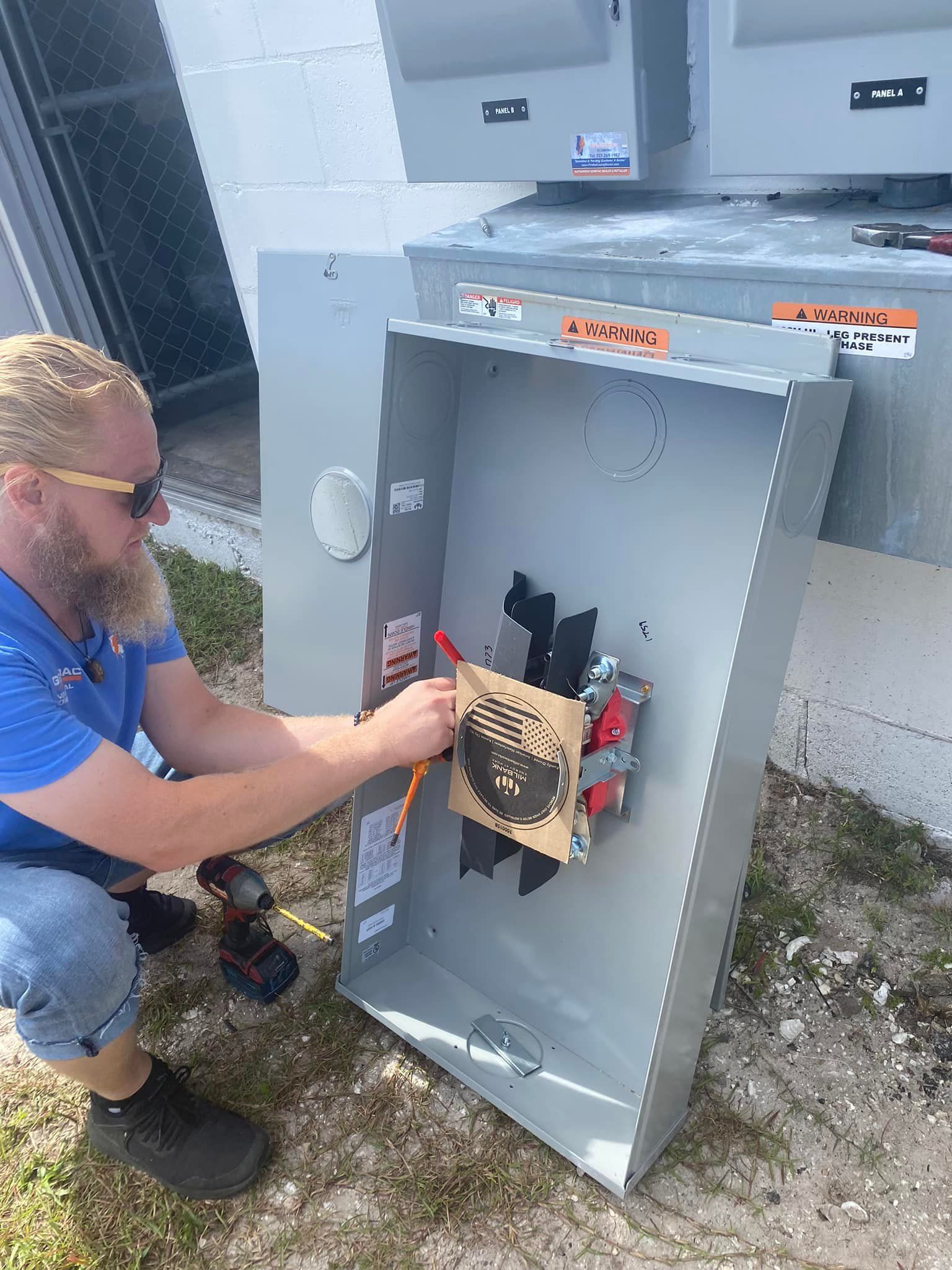ROARING VOLTS
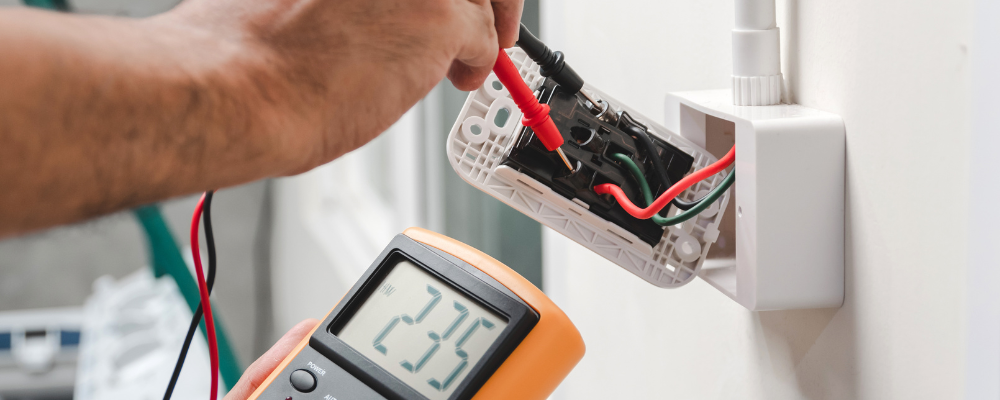
From the Desk of Kevin (yes, that Kevin—the electrician who actually returns your calls) Hey there, Florida friends. Kevin here—your neighborhood spark-slinger from Pinellas County Electric. Let’s talk about something way sexier than it sounds: your electrical panel . I know, I know. It’s not exactly beach-day conversation. But hear me out— summer is the perfect time to upgrade that tired old panel , and here’s why you don’t want to wait until you’re halfway into a sweaty AC meltdown to do it. 🔥 1. Florida Heat = AC Overload = Pop Goes the Breaker When your air conditioner’s working overtime and your fridge is humming to keep up with the 4th of July watermelon stash, your electrical panel is basically training for an Olympic event it wasn’t built for. If your panel is older than your favorite flip-flops , it may not be rated to handle modern appliance loads—and that’s when breakers start tripping like drunk uncles at a pool party. ⚡ 2. Flickering Lights Aren’t Just Creepy—They’re a Clue You turn on the microwave, and the kitchen lights do the cha-cha. That’s not a ghost. That’s your panel begging for an upgrade . Signs it’s time: Lights flicker when major appliances run Your panel smells hot (yikes) You hear crackling It’s still rocking fuses (if so, stop reading and call me right now) 🌞 3. Summer = Best Weather for Electrical Work Let’s be honest: hurricane season is not the time to be swapping out panels. Summer’s early stretch gives us the best shot at dry days and safe scheduling. Plus, if you’re planning upgrades like: Pool pumps Hot tubs EV chargers Outdoor kitchens ...you’re gonna need more amps to party properly. 💡 4. Safety Isn’t Seasonal, But Fire Hazards Spike in Summer Old panels = increased risk of electrical fires, especially when circuits are maxed out 24/7 with fans, AC, fridges, and all the extras. An upgrade is the kind of peace of mind that actually pays off—not just in safety, but in insurance, resale value, and energy savings . 🚀 Ready to Power Up? We’ll come out, inspect your current setup, and give you a no-pressure quote. Fast. Friendly. No BS. Just Pinellas County Electric’s Triple Threat Guarantee : ✔️ Safety ✔️ Efficiency ✔️ Performance Because we don’t just wire homes—we future-proof them . 📞 Call us today or schedule online: (727)626-3414 | PinellasCountyElectric.com Let’s make this the summer you stop resetting breakers and start flipping the switch on smart energy. —Kevin ⚡ Still sweating but smiling
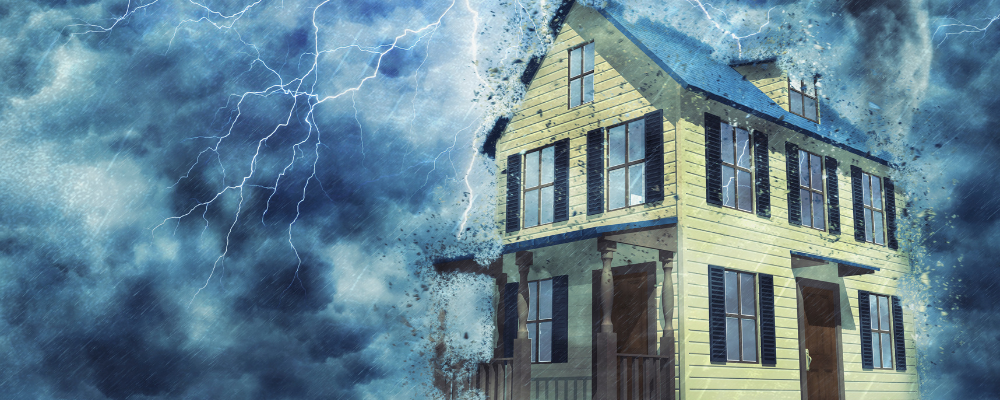
Hello, friends and family! Kevin here, your neighborhood panel pros. Let's talk about surge protection. First, let's break down what a surge protector actually does. It's like a bouncer for your electrical system, standing guard to keep out any unwanted spikes in voltage. When a surge protector detects a sudden increase in voltage, it diverts the excess power to the ground, preventing it from frying your precious electronics. It's like a superhero saving the day, one voltage spike at a time! Now, let's talk about what happens when lightning strikes. It's like a giant bolt of electricity shooting through the air, looking for the path of least resistance to the ground. If your home is in the way, you could be in for a world of hurt. But don't worry, we're here to help! A surge protector can come in different forms and help protect your home from lightning strikes in a few ways. Lightning Rods: Think of these as the ultimate lightning repellent. They're designed to attract lightning and provide a safe path for the electrical current to travel to the ground, away from your home. It's like giving lightning a VIP pass to the ground Surge Protection: As we mentioned earlier, surge protectors can help prevent power surges caused by lightning strikes from damaging your electronics. They're like the ultimate power-up for your electrical system! Grounding Systems: These work in tandem with lightning rods and surge protectors to provide a safe path for lightning to travel to the ground. It's like creating a superhighway for lightning to travel safely away from your home. Now, let's talk about the importance of whole-home surge protection . It's like having a team of bodyguards for your electrical system. By installing a whole-home surge protector, you can protect your entire home from power surges caused by lightning strikes, power outages, and other electrical disturbances. It's like having an invisible force field around your home A surge protector can be a valuable tool in protecting your home from the wrath of Mother Nature. But remember, it's not a foolproof solution. Lightning is a powerful force, and sometimes even the best surge protectors can't stand up to its might. So, be sure to take other precautions, like installing lightning rods and grounding systems, to give your home the best possible protection Stay safe out there, folks! And remember, when it comes to protecting your home from lightning, We've got your back at Pinellas County Electric, call us at (727)626-3414.

Hello, fellow Floridians! Kevin here from Pinellas County Electric , your friendly neighborhood electrical contractor. If you’ve ever wondered what’s going on behind those mysterious panels in your home, you’re not alone. Today, I’m shedding some light on circuit breakers – those unsung heroes of electrical safety – and the not-so-heroic symptoms they might exhibit when they’re in trouble. Grab your tool belt (or just a cup of coffee) and let’s dive in! 1. Frequent Tripping: More Annoying than a Mosquito in July Does your circuit breaker trip more often than you do on vacation? If you're resetting it more frequently than you’d like, it's trying to tell you something. Frequent tripping can be a sign of overloaded circuits, short circuits, or even a ground fault. It’s like your breaker’s way of waving a little red flag and saying, "Help! Something’s not right!" 2. Burning Smell: Eau de Electrical Fire If you catch a whiff of something burning near your electrical panel, that’s a big, flashing neon sign that you’ve got a problem. A burning smell could indicate overheated wiring or components, which is not just bad news – it’s dangerous. Don’t ignore it; get it checked out ASAP! 3. Flickering Lights: The Ghost of Electrical Problems Past Sure, flickering lights can add ambiance to a spooky story, but in real life, they’re more creepy than cool. If your lights are doing the flicker dance, it could mean your circuit breaker is struggling to keep up with the load. It might also indicate loose wiring or a problem with the breaker itself. 4. Hot Breaker Panel: Toasty is for Toasters, Not Breaker Panels Feeling the heat? If your breaker panel is warmer than your morning toast, that’s a red flag. Breaker panels should not get hot; if they do, it means there’s excessive current flow or a malfunctioning breaker. In either case, it’s time to give us a call. 5. Old Age: Not Just for Wine and Cheese Circuit breakers, like us, don’t age like fine wine or cheese. They have a lifespan, and if yours are getting up there in years, they might not be as reliable as they used to be. An aging breaker can fail to trip when it should, leading to potential electrical hazards. If your home is sporting vintage breakers, it might be time for an upgrade. 6. Physical Damage: Breakers Aren’t Boxers If your breaker panel looks like it’s been in a bar brawl, it’s probably time for some TLC. Physical damage to breakers or the panel can compromise their ability to function properly. Dents, cracks, or corrosion are all signs that it’s time to call in the pros (hint: that’s us!). 7. Strange Noises: Your Breaker Panel Shouldn’t Hum Like a Karaoke Bar Humming, buzzing, or any other strange noises coming from your breaker panel are not normal. It’s not trying to start a band – it’s likely trying to tell you there’s an electrical issue. Loose connections or failing components can cause these noises, and they shouldn’t be ignored. When in Doubt, PCE It Out! If you’re experiencing any of these symptoms, don’t wait for a circuit breaker meltdown to ruin your day. At Pinellas County Electric , we’ve got the expertise and enthusiasm to handle all your electrical needs with a smile and a touch of humor. After all, keeping your home safe and sound is our top priority – and we like to have a little fun along the way. Stay safe, stay powered, and remember: when it comes to electrical issues, PCE is your go-to team. Give us a call or drop by our office in Clearwater. We’re always here to help, one circuit at a time! Till next time, keep those lights shining bright and those breakers in check! Cheers, Kevin from Pinellas County Electric
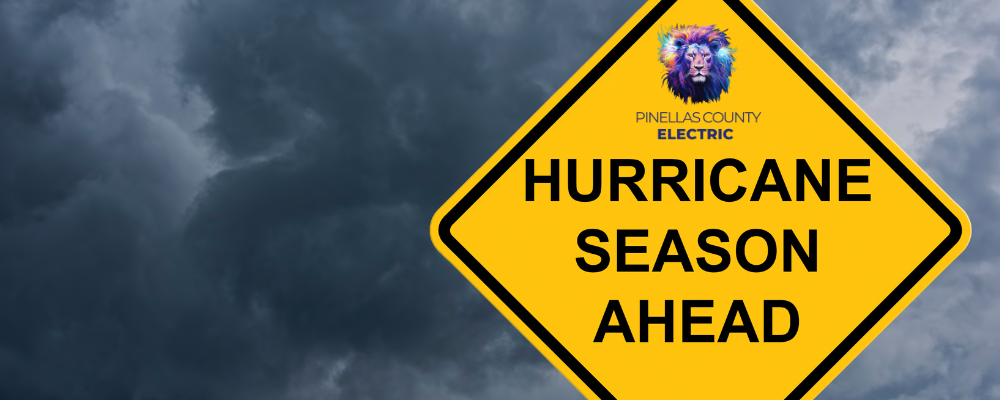
Hey there, wonderful readers! Hurricane season is upon us, and while we can't control the weather (yet!), we can definitely help you get ready for it. At Pinellas County Electric , your safety is our top priority, and we believe that a little preparation goes a long way. To make storm prep a breeze, we’ve put together a fantastic, free eBook: “Ride Out the Storm: Your Ultimate Guide to Hurricane Preparedness.” It's packed with practical tips, essential checklists, and just enough humor to keep things light. Because let’s face it, a little laughter can make even the stormiest days brighter! What’s Inside: Storm Categories Demystified: Because understanding your frenemies is the first step. Home Fortification Tips: Turn your home into a fortress against the winds. Emergency Kit Must-Haves: All the essentials, plus a few fun extras (chocolate, anyone?). Evacuation Planning: Get your route sorted so you don’t end up in Timbuktu. Safety Tips During and After the Storm: We’ve got your back through it all. Why wait until the sky turns grey? Download your free guide now and become the hurricane hero of your household.

Although, there is a shift into alternate forms of energy such as solar and geothermal power in recent years, the truth is that normal energy and residential electrical services will be in need for quite some time into the future. Like anything involved with the generation of energy, electricity-based systems are prone to certain issues that must be addressed. To help you get a handle on what you may deal with from time to time, we’ve compiled some common electrical home repairs that your house may need. Burnt Out Light Bulbs: One of the most common of all electrical home repairs could also possibly be the simplest to fix. Light bulbs may burn out because the voltage is too high for the bulb, a circuit or switch is faulty, there’s not enough airflow around it, and a few other reasons. Those reasons may necessitate a professional repair, but if the bulb is simply old, try replacing it with newer, eco-friendly bulbs such as LED or CFL. Tripping Circuit Breaker: At some point, we’ve all dealt with a tripping circuit breaker. This is often the result of plugging in too many appliances to a single outlet that simply can’t handle the voltage, but it could indicate problems with the breaker itself. There may be a short circuit, ground fault, arc fault, or be an indication of age. If it trips on a regular basis, replacement may be necessary. Flickering Lights: The simple solution with a flickering light is to tighten the bulb so that it makes a better connection. You can also try removing the bulb to ensure that something isn’t impeding the connection. Besides that, it could be due to a faulty switch, poor wiring, or too many appliances on a single circuit. If it’s a faulty switch, you can replace it yourself or have a professional do it. If it’s a wiring problem, though, you definitely want to call a pro to have the electrical work done. Hot Ceiling Fixtures: Electrical home repairs come in all shapes and sizes. If you touch a ceiling fixture and the area surrounding it feels warm, this could be due to the use of bulbs that exceed the recommended wattage. In these cases, you can switch to LED or CFL bulbs, which don’t generate as much heat. If this doesn’t seem to be the issue, however, then it could be due to a lack of sufficient insulation. An electrician will be able to analyze the problem and offer the proper solution. Frequent Surges: Surges in your electrical system can be the result of a nearby lightning strike, faulty appliances, electrical wiring problems, or power line damage. A single surge of electricity isn’t a big deal, but frequent surges can damage your home’s electrical components and lower their operational lifespan. If you have any devices hooked up that may not be well-made, unplug them and see if that helps. If the problem persists, it’s probably time to call an electrician. Non-Working Outlets: This is one of those bothersome problems that many homeowners seem to let go for a very long time. You plug a device into an outlet and it doesn’t work, so you simply switch to another outlet. As electrical home repairs go, this one’s pretty simple, too. Depending on what the precise issue is, you may or may not need the help of a professional. If you’re comfortable with replacing an outlet yourself, you can try that first. If it’s the wiring and not the outlet that’s bad, you’ll need to call an electrician. Electrical Shocks: Every electrician has received multiple shocks in their careers. It’s an occupational hazard. In fact, electrical shocks from some sources can be strong enough to knock them off their feet. For most shocks that you may experience at home, they’re likely to be mild. Even so, this isn’t something that you want to mess with, so it’s not really worth testing to see if it’s a specific device that’s causing the shock. It’s much safer if you call an electrician right away. Burning Odors: An electrical burning odor should automatically send up a big red flag. This could indicate an issue with a device that you’ve plugged in, but a wiring issue is very often the culprit. This could easily turn into a fire hazard if it hasn’t already, so if this is your issue, call a professional electrician right away. To be safe, switch off the circuit leading to whichever outlet seems to be the source, unplug all devices, and leave the circuit off until the pro arrives. Contact Pinellas County Electric for Electrical Home Repairs Putting your trust in a reputable electrician in Pinellas County is the best way to deal with electrical home repairs as they arise. If you have any questions or would like to request your electrical service, give the team at Pinellas County Electric a call at (727) 88-VOLTS today to schedule a consultation.
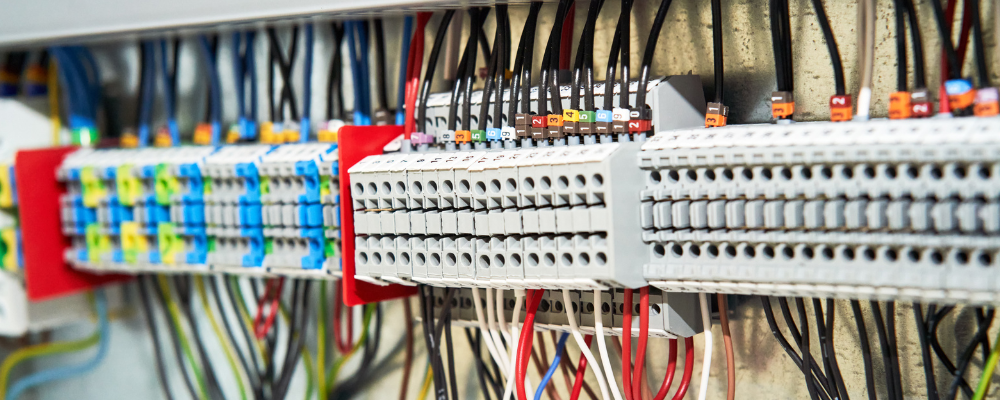
Being a homeowner is like riding a rollercoaster. Fun, a bit of a challenge, and there’s always something new around the corner. One such twist? Getting to know your electrical service panel – the unsung hero that sends power zipping around your cozy abode. Think of the electrical panel as the maestro of your home’s symphony. It’s the genius that connects the electrical vibes from the outside world to the groovy music in your home, or in other words it manages the electricity from the electric company and distributes it throughout your home. So, it’s super important to get to know your panel, and when you do you’ll be one step closer to becoming a home-electricity wizard. Finding That Elusive Panel Now, your electrical panel is a bit of a shy type. It usually hides in spots like the garage, basement, utility closet, or even in the sneaky kitchen pantry. Those with vintage homes? Peek outside. It might just be chilling on an exterior wall. A Peek Inside the Panel Pop open that panel door and voila! Main Circuit Breaker: It’s like the head honcho of the gang. Shut it off, and your home goes into power nap mode. Circuit Breakers: Your panel’s little soldiers. They come as single-pole for 120 volts and double-pole for 240 volts – ideal for those appliances that like a bit more juice, like your trusty air conditioner. Sub-panel: A fancy add-on if you’ve got a generator or extra breaker space. Panels come with style and size. Ranging from 100 amps to a whopping 400 amps, the modern home usually rocks at least a 200 amp because, well, who lives without a heater or AC? Panel Types 101 Main Breaker Panel: Your everyday, standard panel. It’s all about controlling and distributing power. This is the most commonly used panel type, which controls electricity that flows into each of the areas in your home. It is designed to distribute a certain amperage to each circuit and cut power when needed to prevent overheating. Fuse Boxes: These bad boys use fuses to keep everything in check. When excess current flows through a particular circuit, the fuse shorts out, so you have to make sure they allow enough current to flow to your appliances and keep an eye on ’em! Main Lug Panels: These panels have lugs that the line wires can run into, so they do not have a main breaker. You can connect the main lug to your main breaker to act as a sub-panel, with the latter being a separate disconnect. Transfer Switches: Got a generator? These switches will transfer power from the generator to the electrical power in the main panel to supply power even during outages. Getting regular check-ups, at least once a year will ensure safety and give it a long life of 20-30 years! Give Pinellas County Electric a buzz at 727-88-VOLTS to ensure all’s smooth and zappy.

Commercial buildings service several people on a daily basis amounting to hours of prolonged electricity use that may require complicated wiring systems. These establishments become prone to electrical errors, so it is a good practice to perform routine checks to ensure the safety and effectiveness of your electrical sources. But, before you find the need to hire electrical services in buildings, what are the common commercial electrical problems found in commercial buildings? Flickering Lights: Flickering and dimming lights can strain the eyes of your employees and delay the accomplishment of tasks. To properly carry out daily operations, a commercial building will require working lights. It’s common for light bulbs to burnt out. Your electrical system can be checked through general troubleshooting. Electrical services in buildings may be needed to check for a loose connection in the circuits or repairing faulty wiring that the common individual can overlook. Power Loss and Damage to Appliances: Among the electrical issues commonly faced by a commercial building, an unexpected power loss can be a major problem. A power outage could leave your building without heating or air conditioning, can damage appliances, and possibly miss out on potential customers. If backups are not set in place, your company could suffer from information loss due to the lack of an electrical supply. Overloaded Electrical System: After a power failure, there can be instances wherein breakers trip if the circuits in the electrical system are overloaded with the constant use of electrical devices. A professional electrician will effectively assess and repair the electrical system. Commercial electrical services in buildings may be needed to upgrade its electrical work and add a circuit. Faulty Wiring System: Without the help of electrical contractors to execute electrical services, common electrical problems will occur. Faulty installations of commercial electrical systems in buildings can have poor connections and lead to fire hazards. If you install the wrong wire length to connect equipment in your electrical system, it could lead to short circuits. A professional commercial electrician should perform electrical work so you can be sure that your light bulbs, heaters, air conditioning, and other appliances are installed correctly. Overheating Equipment and Switches: If your equipment and switches become unusually hot, this common electrical problem may lead to a power failure or electrical breakdown. Wires can melt or burn with continuous plugging of appliances into outlets with visible sparks. Loose connections are a common commercial electrical problem that is often overlooked, which can lead to overheating and cause accidents or create possible fire hazards in the workplace. Protect your employees from slip hazards by hiring electrical services in buildings that can provide suitable fixes and prevent further damages to your electrical system. Short Circuit: The misuse of electrical equipment may call for electrical services in buildings. If an employee uses an appliance with a faulty cord or a damaged extension cord, this can lead to a short circuit. Wirings without the proper protection can easily be tampered with by natural elements and humans that can greatly affect the power supply, and lead to fire hazards. A ground fault: This can also happen if an employee uses an appliance without proper insulation. If you plan to upgrade your office, such as installing new outlets, you should hire a reliable electrical contractor for the renovations. The safety of your commercial building and employees is top priority, therefore regular electrical inspections is prudent. Contact Pinellas County Electric at 727-88-VOLTS and let us provide your electrical services in buildings and perform the proper maintenance, repair, and replacement of your electrical system!

Home inspections are vital when shopping for a home or planning a renovation. Inspections give you a clear picture of the condition of a house and problems that may affect the sale price or remodeling project size. While home inspectors generally look into different aspects of the property, it is often recommended to also get an electrical home inspection to pinpoint problems that may have been overlooked. As the name suggests, a specialized electrical inspection focuses more on checking the integrity of electrical systems and wirings in place. Assessing these areas is especially important since problems related to them can lead to safety risks. With a qualified electrician to do the job, you can take immediate action by updating wirings or replacing circuit breakers to maintain safety at home. When hiring a professional to conduct an electrical home inspection, here are some of the most common issues that usually arise during the check: Service Panel Issues Every home’s electrical service panel serves as the central source of electricity, so any problems related to it can easily compound to bigger concerns later on. Some issues may be observed in an inspection include loose or double-tapped circuit breakers, lack of the main disconnect switch, or an overall damaged panel. Circuit breakers in older homes can be particularly faulty as they were not designed for the electrical needs of more advanced appliances. This may result in frequent tripping due to your breaker panels overloading from their inability to manage the amount of electricity flowing through. Improperly Wired Switches Perhaps one of the most common issues found in an electrical home inspection would be improperly wired switches. In most cases, this happens when a non-professional or poorly trained electrician does the wiring and mixes up the neutral and hot wire slots. When this happens, it causes an issue known as reverse polarity, which can cause potential shock hazards. Aluminum Wiring While it may not seem like an issue, aluminum wiring can be a cause of concern since aluminum is not as effective a conductor as copper. Overall, the metal can become defective quicker, so the longer it is used, the higher the risk of fire hazards. Due to this, many home insurance companies opt not to insure homes that are wired in aluminum. Lack of GFCI Protection GFCI, short for ground fault circuit interrupters, are required in kitchens, bathrooms, laundry rooms, and other places with moisture and where the outlet may come into contact with liquid. These outlets are safety standards set in building codes to minimize the risk of shocks and burns in any home. Given the number of people who go in and out of the affected areas, it must enforce stricter GFCI protection throughout your home. Through a professional electrical home inspection, you can double-check to see if your home’s GFCI outlets are working properly, installed correctly, or need replacements to prevent bigger problems from arising. Knob-and-Tube Wiring Similar to the issue on aluminum wiring, knob and tube wiring is one of the older variants of electrical wiring used back in the early 1900s. While it is not inherently dangerous, it can be highly risky since it does not use a ground wire and thus cannot accommodate three-pronged electrical devices. Knob and tube wiring also uses rubber, as opposed to plastic, as an insulator, which can break down over time and cause issues like overheating and shock or fire risks. Overuse of Extension Cords Extension cords can be convenient to plug in multiple devices at a time, but you have to be careful not to get over-reliant on them. The national electric code requires that homeowners reduce the use of these extension cords since doing so can increase the likelihood of tripping hazards and other safety concerns. If a home is found to be using these extensively during an electrical inspection, it is likely a sign of having insufficient power outlets. Schedule an Electrical Home Inspection Today With Pinellas County Electric A thorough inspection from a professional electrician in Pinellas County can help you check what problems need to be addressed in a home. Whether you are remodeling your place or looking to purchase a home, you want to make sure your property is in its best condition. Learn more about what Pinellas County Electric offers by calling us at 727-88-VOLTS to schedule an inspection. With over 150 years of combined experience in the industry, we can guarantee that our team can solve your electrical concerns.


